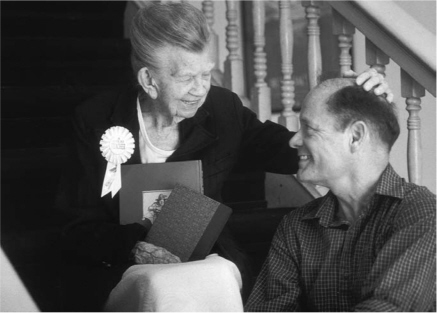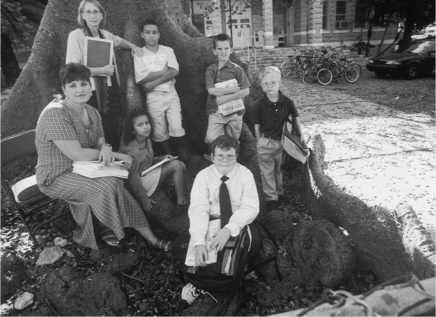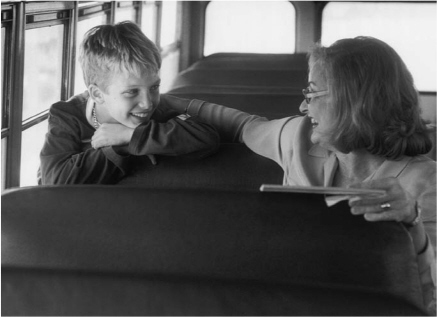Chicken Soup for the Soul Celebrates Teachers (3 page)
Read Chicken Soup for the Soul Celebrates Teachers Online
Authors: Jack Canfield

W
hen William Stidger taught at Boston University, he once reflected upon the great number of un-thanked people in his life. Those who had helped nurture him, inspire him or cared enough about him to leave a lasting impression.
One was a schoolteacher he'd not heard of in many years. But he remembered that she had gone out of her way to put a love of verse in him, and Will had loved poetry all his life. He wrote a letter of thanks to her.
The reply he received, written in a feeble scrawl of the aged, began, “My dear Willie.” He was delighted. Now over fifty, bald and a professor, he didn't think there was a person left in the world who would call him “Willie.” Here is a copy of that letter:
My dear Willie,
I cannot tell you how much your note meant to me. I am in
my eighties, living alone in a small room, cooking my own
meals, lonely and, like the last leaf of autumn, lingering
behind. You will be interested to know that I taught school for
fifty years and yours is the first note of appreciation I ever
received. It came on a blue-cold morning and it cheered me as
nothing has in many years.
Not prone to cry easily, Will wept over that note.
She was one of the GREATEST UN-THANKED PEOPLE from Will's past. You know them. We all do. The teacher who made a difference. That coach we'll never forget. The music instructor or Sunday school worker who helped us to believe in ourselves. That Scout leader who cared.
We all remember people who shaped our lives in various ways. People whose influence changed us. Will Stidger found a way to show his appreciationâhe wrote them letters.

Who are some of the un-thanked people from your past? It may not be too late to say, “Thanks.”
 Steve Goodier
Steve Goodier
[EDITORS' NOTE:
“Un-Thanked People” was broadcast by William L. Stidger on
his nationwide radio program,
Getting the Most Out of Life,
aired by NBC from
1937 to 1940 and later published in
Sermon Nuggets in Stories,
Abingdon-
Cokesbury Press, 1946. Stidger's grandson, Jack Hyland, recently published a
biography entitled
Evangelism's First Modern Media Star: The Life of Reverend Bill Stidger,
Cooper Square Press, 2002.
(
www.stidger.com
).]
I
was a little nervous about my students remembering the more difficult songs. I thought that we didn't rehearse enough to do the songs justice. However, I was sadly mistaken. My students performed brilliantly. Bing Crosby himself couldn't have done a better job on that warm Arizona winter day. My students sang with an honest heart and with simple intentions. I believe that this sentiment is what made them shine through as beautifully as they did.
My class and I were on a field trip to Chris Ridge Retirement Home and Care Center in Phoenix, Arizona. We were there to sing holiday songs to people who might have needed a little cheering up during the holiday season. This care center has three floors. The first two floors were for residents requiring help in taking care of themselves. The third floor was an Alzheimer's unitâa lockdown floor where the patients' dementia had progressed significantly. Most residents on this floor seemed to wander around in a dazed and confused state. The lockdown was to prevent any of the residents from wandering off and becoming lost in the busy city. This floor made my students the most nervous.
We sang beautifully on the first two floors. The residents loved our songs and the cards that we left with them. My students were truly feeling the holiday spirit as we entered the elevator to take us to the third floor. Their apprehensions quickly set in as we stepped off the elevator and into the lobby of the third-floor unit. As the residents were put into their chairs for our performance, my selfish mind asked itself,
What good will we do here? These people don't recognize
that we are even here. How are they going to appreciate our singing?
As we began singing, most of the residents stared off at the walls or floor. It seemed as though my premonition was going to be right. However, one lady caught my eye. She was sitting by the door, in a wheelchair, singing songs to herself. They weren't the songs that we were singing, at least they didn't sound like it. As we got louder with each festive song, she did likewise. The louder we got, the louder she got. As she was singing, she was also reaching out to us with her hands and body. I knew that I should have gone over to her, but I thought that my responsibilities were to my students.
People who worked at the care center could attend to her,
I thought. Just when I stopped feeling guilty about not giving her the attention she needed, one of my students, Justin Proctor, showed me what the holiday season is really about.

Justin noticed the same lady by the door. The difference between us is that he acted on her needs, and I didn't. During the last song, “Silent Night,” the lady was singing the loudest that her lungs could let her. She was reaching out as far as she could, almost to the point of falling out of her wheelchair. Justin stopped singing. He walked over to her and grabbed her hand and held it during the rest of the song. He looked this aged lady in her eyes and with his actions said, “You are important, and I will take my time to let you know that.”
This tired, elderly lady seemed to regain, if only for a moment, what she had lostâher memory. She stopped singing and held his hand. She then took her other hand and put it up to his face. She touched his cheek. Tears began to fall down her wrinkled face, as the memoriesâfor that brief momentâbegan to rush back into her mind. No words can completely portray that poignant moment. It took a boy to teach me, a man, about kindness and love. Justin's example of complete, selfless compassion toward another was a lesson that I will never forget. He was the teacher that day, and I consider myself lucky to have witnessed his lesson.
 Mike Ashton
Mike Ashton

I
was the new teacher at school, and Clarissaâa gangly, somewhat grouchy fifth-graderâwas messy. Clarissa saw no need for order. The more she was asked (even nicely) to straighten up her space, the messier she left it. The more she was reminded sternly to get her space straightened up, the harder she crammed her books, papers, pencils, last week's snack and everything else into her desk.
“It's
my
space!” was most often her response to any reprimand or request from classmates. At times, I was sure I saw a glint of pleasure in her eyes as she dropped a used tissue onto the floor near her desk just to watch her neighbor's reaction.
So the days went by, with Clarissa's space creeping ever slowly into the sacred learning space of my other students. This situation couldn't go on. The complaints began to worsen.
“Good grief! Her stuff is everywhere!” they cried.
“Clarissa, get your purse out of the aisle. I'm tired of tripping over it!” they'd say. I realized she was beginning to alienate herself from her peers. I had to come up with a solution.
One afternoon after she had left, I sat enjoying the peaceful moment that is bliss for all teachers. It's the time of day when there is suddenly a hush over the classroom and you sit at your desk looking around the room. The problems of the day don't seem so large. You begin thinking about what paperwork to take home and what to get ready for the next day. The late afternoon sun was gleaming through the window, and I was surveying Clarissa's space from where I sat.
How does she stand it?
I thought.
As I continued to sit, I came up with an ideaâsomewhat like the lightbulb coming on, the sun suddenly streaming through the windows, the heavenly choir singing. It was just an idea, but it might work! But what would her classmates think? What would the veteran teachers say? “Mrs. S., you're going a bit too far. You'll learn not to baby your students this way. Send her to the office. She needs to get her act together. Call her parents. Throw out her junkâthat'll teach her to mind you.”
Standing next to the window near my desk was an empty two-drawer filing cabinet. What if Clarissa had her own spaceâ some space that was uniquely her own? Not an old beaten-up desk, but some place really neat.
I began to work. I moved her desk and all her things (including the tissues, the old snacks, the candy wrappersâ
candy wrappers?
) near the cabinet. I selected some clean white construction paper and cut out a place card. On it I wrote, “Clarissa's Space.” I drew some small flowersâwild violetsâpurple and green with yellow dots in the middle and set it on top of the filing cabinet. I gathered my things together and headed for home.
